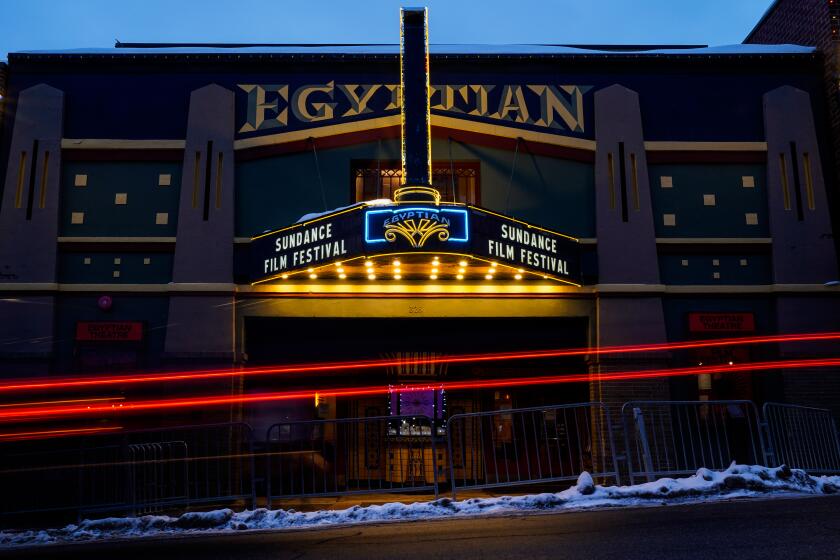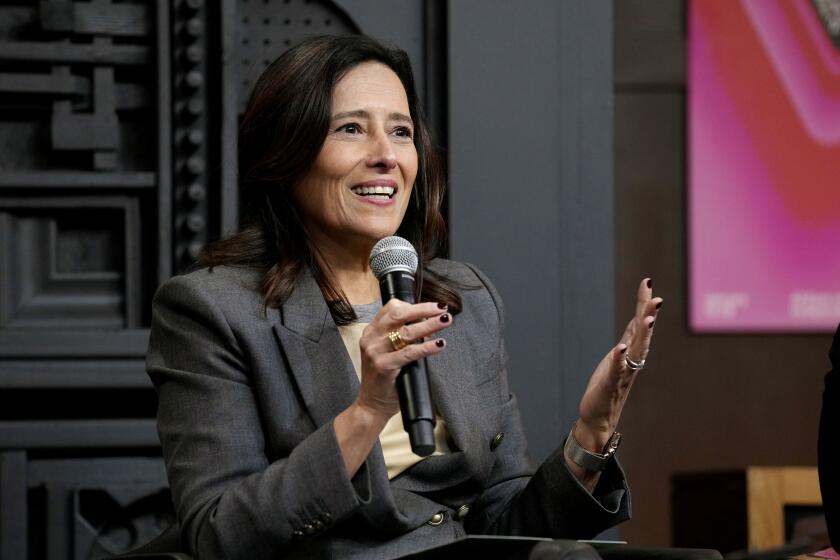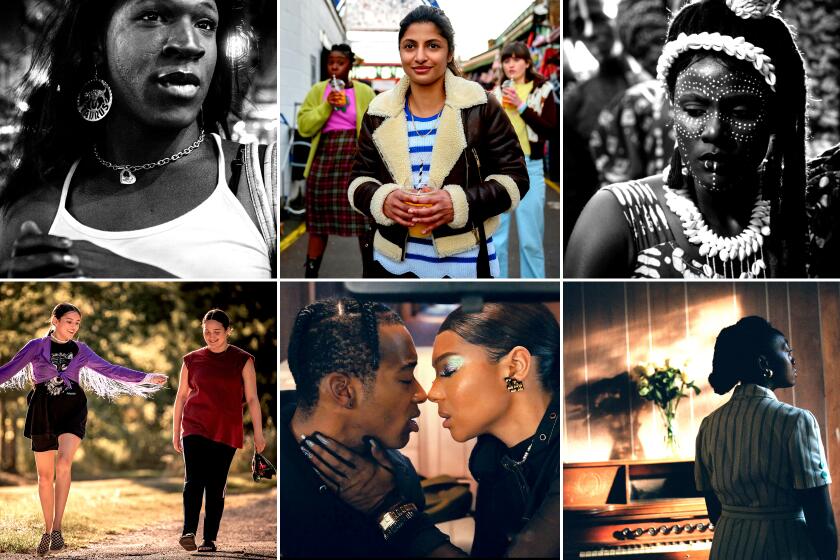Why ‘Promising Young Woman’ is much more than a #MeToo-era revenge story
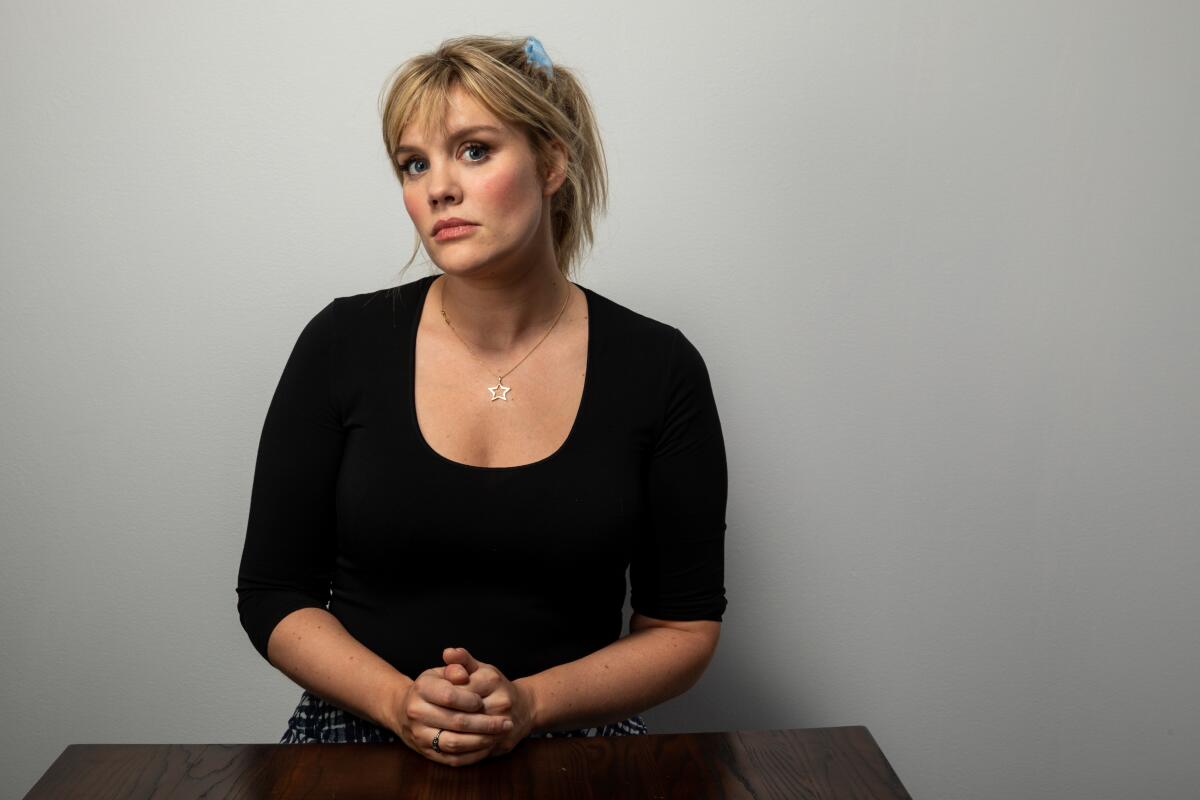
- Share via
PARK CITY, Utah — With more than 3 million views for its provocative trailer since December, “Promising Young Woman” is among the most anticipated films of this year’s Sundance Film Festival.
Written and directed by Emerald Fennell and produced by Margot Robbie’s LuckyChap Entertainment, the movie stars Carey Mulligan as a medical school dropout who instigates a unique form of revenge against men.
The film, which is Fennell’s debut feature, will open theatrically from Focus Features in April. The busy filmmaker and actress was executive producer on the second season of BBC America’s “Killing Eve,” for which she was nominated for two Emmys, and has more recently been portraying the young Camilla Parker Bowles on Netflix’s “The Crown.” And then there is “Cinderella,” the new musical on which she is credited for the story and book with music by Andrew Lloyd Webber, set to open later this year.
Fennell got on the phone recently from London to preview “Promising Young Woman” and discuss what it’s like to be in the center of so much work.

This is such a busy time for you. Is there a trick to balancing all of these different jobs?
Emerald Fennell: I don’t sleep very much, probably. I was really lucky, they weren’t really on top of each other. They were just back to back. So I finished “Killing Eve,” went straight onto “The Crown” and then went and did “Promising Young Woman” and then straight into “The Crown” Season 4. And “Cinderella” has been something we’ve been working on for a couple of years now.
What’s been very nice is they are all very, very different and very different sort of skill sets. “Killing Eve” and “Cinderella” couldn’t be more different. And acting as Camilla Parker Bowles couldn’t be more different from directing “Promising Young Woman.” It’s just been lovely getting to do all those different things. But yeah, I’m pretty tired.
What was the inspiration for “Promising Young Woman?”
I had [a short] at Sundance two years ago called “Careful How You Go,” and it’s about the different ways in which women can be frightening and malevolent. The premise is kind of how can you ruin a stranger’s life without touching them or threatening them or doing anything sinister. That felt like a kind of peculiarly sort of historically kind of female way of enacting rage.
When I was thinking about “Promising Young Woman,” I wanted to make a revenge movie, but a movie about how a woman, a real woman, might take revenge, which is different I think to how we normally see it. In many ways, it’s a revenge thriller, it’s a romantic comedy, it subverts a lot of tropes we’re used to seeing.
So one of the first things I thought of was, “I wonder what would happen if I went to a bar and pretended to be drunk — really, really, drunk. If somebody hit on me and then realized I wasn’t drunk, would they feel weird about it?” And if the answer is yes, which I believe it is, then the argument that there’s nothing wrong with that method of seduction is null and void. You only get caught out, you only feel caught out, if you’re doing something you know you shouldn’t be.
I just wanted to look at our culture in general and all these sort of gray areas that we all live in, particularly when it comes to relationships and men and women and sex and all of these things ... What so often is the case with these things is it isn’t that people disagree on something happening — i.e., somebody says it did, somebody says it didn’t — what often happens is people say something happened, everyone knows the exact same thing happened, but they feel very differently about it and they’ve read the situation very, very differently.
I wanted to make a revenge movie, but a movie about how a woman, a real woman, might take revenge, which is different I think to how we normally see it.
— Emerald Fennell on the inspiration for ‘Promising Young Woman’
That’s such a sticky, fascinating thing to me. And I think much more interesting than the kind of black and white that we so often see in these kinds of movies. This is a movie about people we know and people we love, and how we’d come to terms with the fact that all of us maybe have been complicit in something that isn’t very nice and how we fix that.
The movie is being talked about as kind of a #MeToo-era revenge thriller. How do you feel about that as a shorthand for the movie?
I think it’s a difficult one. Really, firstly, and this is something I do feel quite strongly, it feels a bit icky to use a movement as a kind of jumping-off point for what is essentially a commercial enterprise. So there is something kind of intrinsically difficult about that. Also, I started writing the film before the movement as it is happened.
But the thing that’s so amazing about #MeToo is it’s just the most inspiring, incredible movement and it has put a light on some really nefarious and damaging practices. But it’s also something that certainly women and lots of men I know have been talking about forever. These problems, this world, these things have been going on for centuries really.
So yes, it is topical in a sense of it’s something people are more aware of and they are well-versed in. I would say to most women and a lot of men, this has been an accepted part of their lives for many, many, many years.
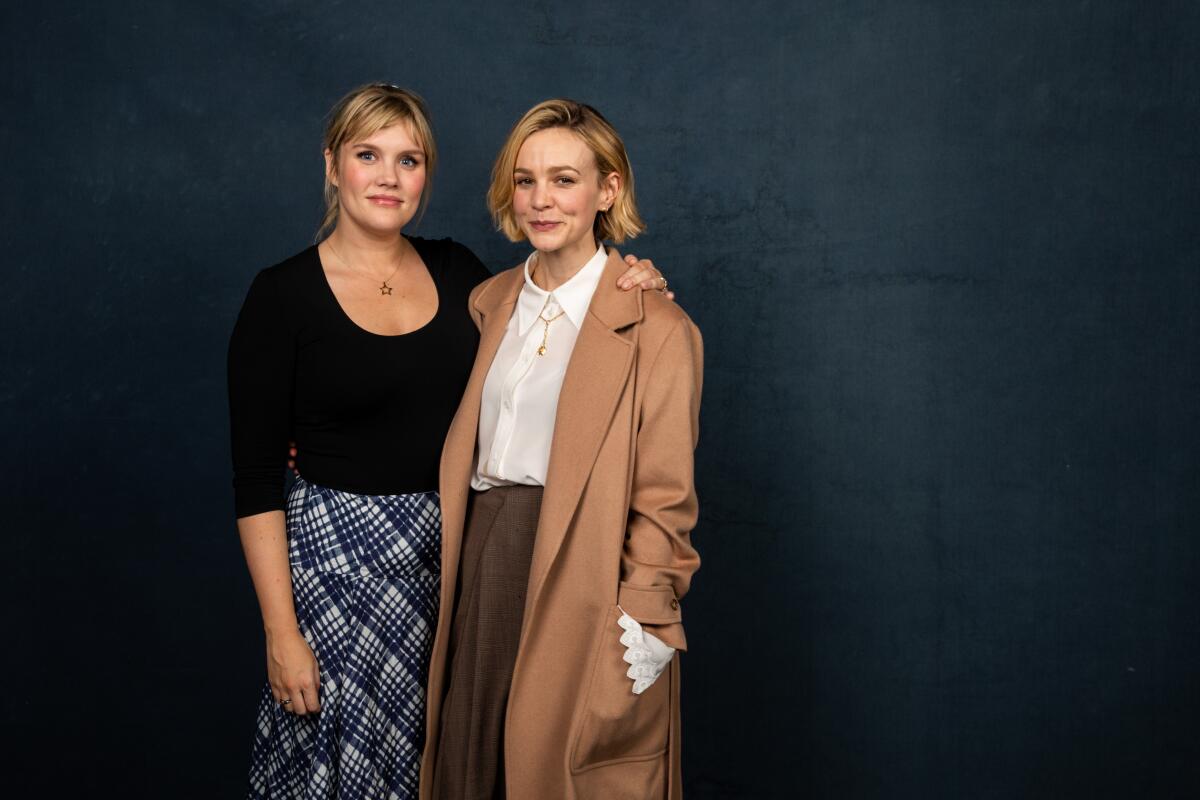
Did you write this for Carey Mulligan? Because the notion of her in this character that assumes different identities or costumes, she seems perfectly fitted for this part.
Well, she was sort of beyond my wildest dreams really. When I wrote it, I knew that she would be just completely amazing. You know, there’s a certain type of character that Carey plays, this sort of very complicated, quite enigmatic person who is being pulled in multiple directions. And it was important to me that the supporting cast were all people we really love and trust. So like Connie Britton and Alison Brie and Jennifer Coolidge, a kind of comedy cast we could feel super comfortable with.
If it’s a film in which somebody necessarily disguises themselves, but obviously without putting on a mustache and a hat, whatever it would be, it has to be someone like Carey who honestly can put her hair in a ponytail and put on a jacket and she can just be a completely different person. Lots of people watching the trailer didn’t recognize her because she’s just so changed. She has managed to change everything.
The movie seems to walk this kind of formal tightrope between having this serious undercurrent while also still having a very pop and entertaining element to it. Was that something that was difficult for you to balance, whether while writing the movie or directing it?
The things that I love, really loved, the movies that I used as touch points were things like “To Die For” and “The Virgin Suicides” and “American Psycho,” movies that are ostensibly about incredibly dark subject matter but kind of treat them with a sort of deftness of touch and a kind of joy.
To make a kind of dark comedy satire genre movie about something serious seems to be the best way of communicating it, just because something is serious doesn’t mean it needs to be, it’s all the more reason for it to be framed in a way that is intriguing.
I really wanted “Promising Young Woman” to come out on Valentine’s Day, and I don’t mean that as a joke. I think what I wanted to make — and the stuff I always want to make — is popcorn, like great proper popcorn, Hollywood movies. Those are the movies that I love.
So for me, if they are also movies that are about something that is complicated, the more the better. But first and foremost it stands, I hope, on its own as a great thriller, and I suppose there’s a sort of Trojan horse in there that is maybe a wider conversation.
More to Read
Only good movies
Get the Indie Focus newsletter, Mark Olsen's weekly guide to the world of cinema.
You may occasionally receive promotional content from the Los Angeles Times.




